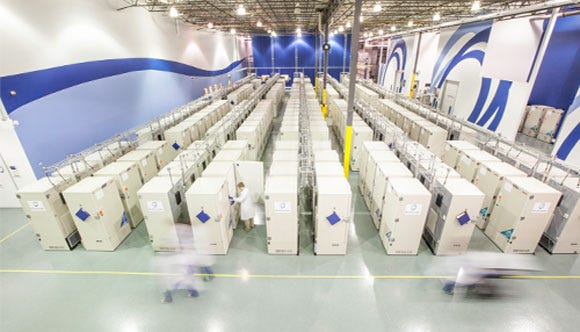Indy Biologistics Company to Spearhead Major Biobank
 Samples will be stored in Indianapolis at negative 112 degrees Fahrenheit.
Samples will be stored in Indianapolis at negative 112 degrees Fahrenheit.
Subscriber Benefit
As a subscriber you can listen to articles at work, in the car, or while you work out. Subscribe NowThe reality of finding a cure for a disease is that it takes copious amounts of data, a near-endless supply of relevant and high-quality samples for researchers to analyze and collaboration among players around the world. Indianapolis-based BioStorage Technologies, Inc. is taking the lead role in all of these efforts for the Crohn’s & Colitis Foundation of America (CCFA) as the organization builds the world’s largest research database for the diseases. Simply put, the life sciences logistics company says it will aim to “coordinate” a cure.
“We may have the cure for a disease sitting in our facility,” says BioStorage Technologies Vice President of Global Operations Russ Hager. “As long as we provide the right stewardship for that sample in our facility, then we’re part of ultimately providing that cure or therapy. That’s what gets us jazzed about doing what we do.”
CCFA, a nonprofit dedicated to finding a cure for inflammatory bowel diseases (IBD), recently earned a $17.5 million grant to add power to its research engine. Its leaders say, rather than biological samples and correlating data being used in a single study then falling into “a black hole,” a new effort called IBD Plexus will coordinate researchers, samples and data throughout the world.
Within three years, IBD Plexus aims to house clinical information on more than 40,000 Crohn’s and colitis patients, along with genomic and microbial profiles from 7,000 patients. CCFA leaders say the project will, for the first time, take various research efforts out of their “silos.”
“That’s been a major speed bump in the road to a cure,” says CCFA IBD Plexus Director Angela Dobes. “To answer really complex questions that are too large for one entity, we have to collaborate on one centralized platform. That provides the ability for everyone to have access to data and spark projects where there can be collaborations with academia, industry and patients.”
BioStorage Technologies will be building that global platform. The logistics company will spearhead the collection and transportation of the thousands of blood, tissue and other biological samples being collected at hospitals and clinics around the globe. The materials will be stored in Indianapolis and a partner location in New Jersey at a mind-boggling negative 112 degrees Fahrenheit.
“We’ll be tracking a sample from the moment it’s collected with the phlebotomist or doctor all the way until it reaches us,” says Hager. “Where was it? How long did it take to go from Point A to Point B? How that sample is treated throughout the whole supply chain is important to the viability of that sample for research.”
BioStorage Technologies will also perform genomic analysis on the samples to help researchers uncover new treatments and cures for IBD. The effort represents CCFA’s shift to a precision medicine approach to research, which is a medical model that involves individualized treatments based on a person’s unique DNA makeup.
Dobes says BioStorage Technologies’ track record in creating and managing such biobanks was a key factor in choosing the Indianapolis company as a partner.
“This [biobank] will be the largest [IBD-focused] cohort in history to be centralized in one place,” says Dobes. “We were especially impressed with [BioStorage Technologies’] in-house bio-sample inventory storage technology they built from the ground up. It’s beyond impressive and especially crucial for our initiative, due to the volume of samples we’ll be acquiring and distributing.”
From collecting the samples to transporting, analyzing and shipping them out to scientists for study, Dobes says—above all—researchers demand a biobank vendor they can trust, and many of them voiced their approval of BioStorage Technologies.
“It sounds kind of mundane what we do,” says Hager, “but if we don’t do our job correctly, then all of the work that’s gone into finding subjects, getting their permission and collecting that sample—it’s all worthless. The samples are irreplaceable, they’re one of a kind—every single one of them—and that’s how we approach our work every day.”
Hager says the scale of the CCFA project is a big undertaking.
Dobes says the conventional method of IBD research was limiting collaboration.
Dobes says CCFA will have expectations for researchers to contribute to “the common good.”
